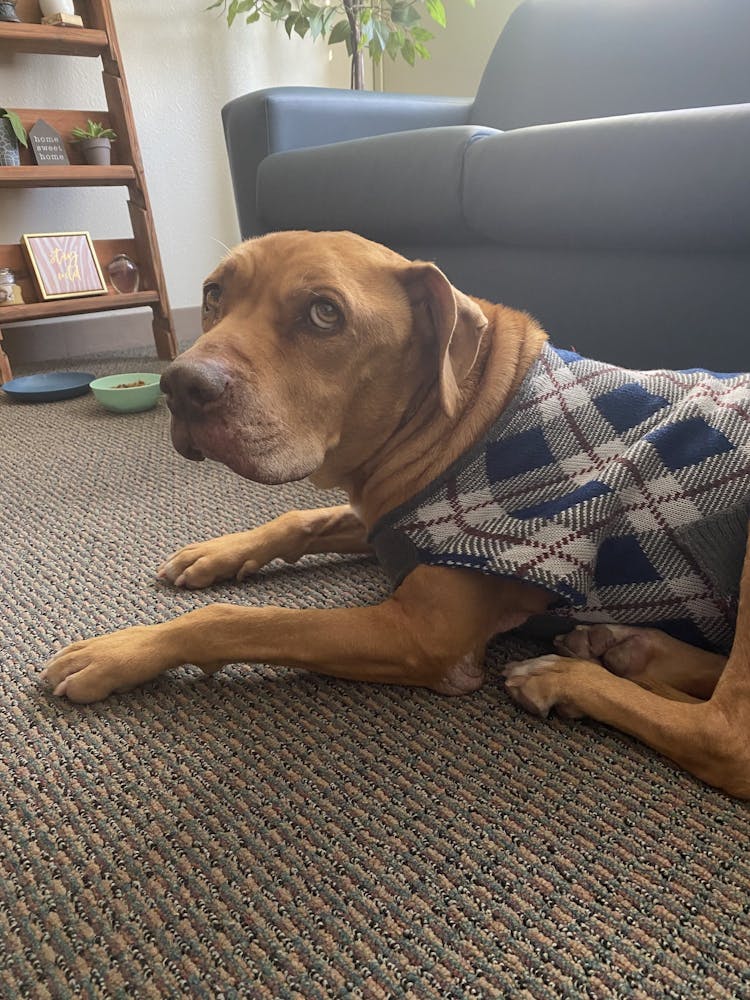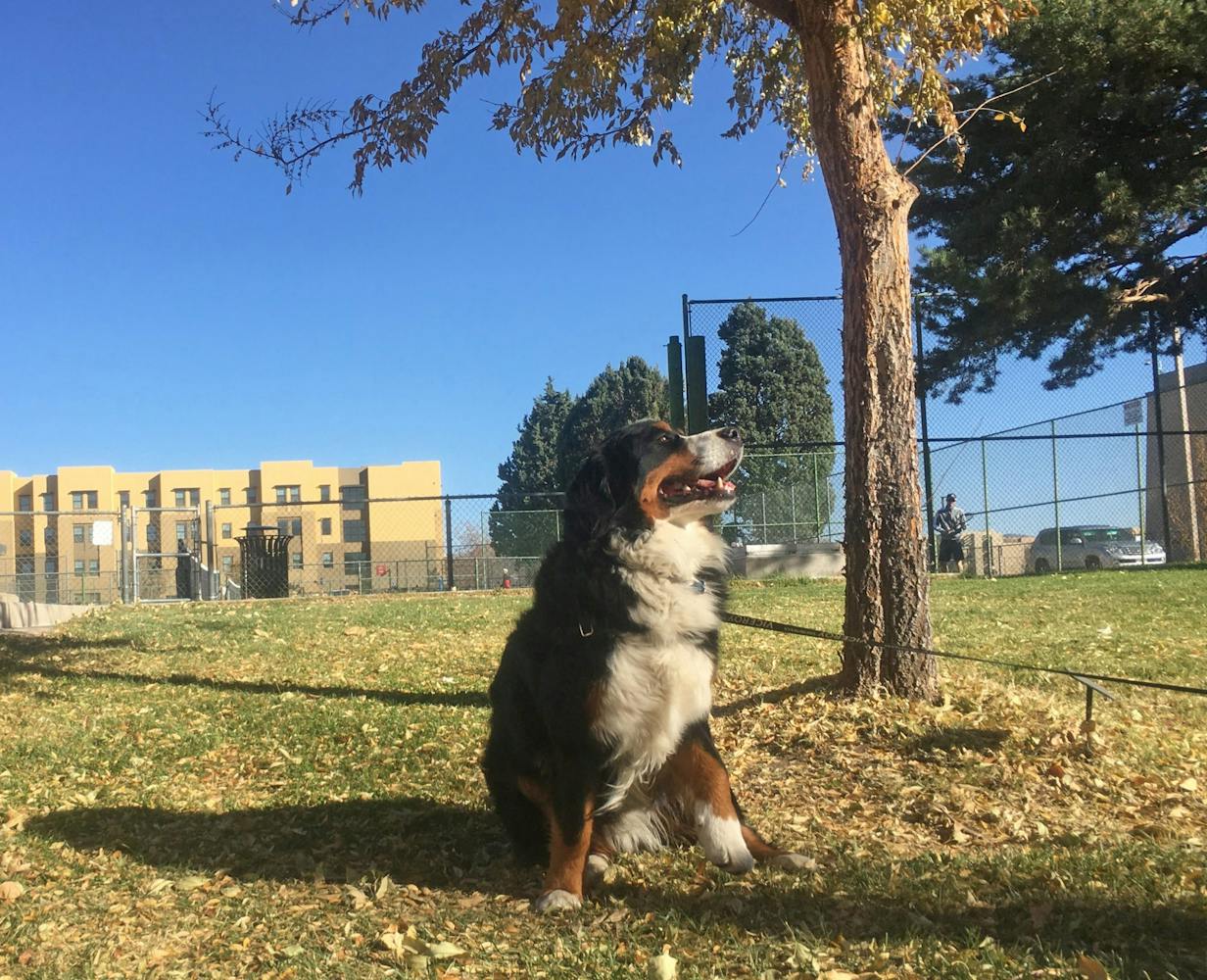There's no doubt that this year has thrown us many curveballs. With the amount of stress everyone may be going through, it's important to take a step back and remember something as simple as petting a dog can make all the difference.
According to an article shared by the University of New Mexico’s human resources department, “Stroking, hugging or otherwise touching a loving animal can rapidly calm and soothe us when we’re stressed or anxious.”
The article gives many examples of how trained dogs can help people have a healthy lifestyle. They provide companionship and stress relief while adding structure and routine to the day, which are things that many students could use while living in a dorm during a pandemic.
Halfway through the fall semester, four medical students living in the Redondo Village Apartments decided to adopt a dog. After visiting the Eastside Animal Shelter, they brought home a 12-year-old English bulldog named Bones.
Sophomore Sameen Jawadi, co-owner of Bones, said they specifically wanted to get an older dog so that they could make sure the last few years of its life are happy.
“He’ll play basketball with us and literally hit the ball with his nose and play with us,” co-owner Aly Aragon said. “He has a lot of energy, so we’ll take him out a lot, and then he’ll come back and snooze for a couple hours while we study.”
Aragon said all four roommates plan on living together for the foreseeable future, and even planned out where they see themselves in the next five years to ensure that they could responsibly care for Bones.
“If you have the time and responsibility to take care of a pet, I would recommend it because I think emotionally it's just something that mentally helps students,” Jawadi said. “Especially now because we are basically quarantining almost every day and we’re just studying all day, so it’s a nice thing to look forward to.”
Sophomore Peter Cabrera, who lives in Santa Clara Hall, doesn’t have a dog in his dorm but said he tries to walk his friend's Australian cattle dog Sasha whenever he has time.
“She definitely lowers stress,” Cabrera said. “Just being around her and petting her automatically puts you in a better mood. She’s full of love, man.”
According to UNM Residence Life and Student Housing, approved emotional support animals (ESA) or service dogs are allowed to live in any of the on-campus housing.
The only places that allow non-ESA pets on campus are Santa Clara and the Student Residence Center apartments, although they require adherence to certain rules and conditions.
Get content from The Daily Lobo delivered to your inbox
“I think it should be more of an option for students to have a pet, especially because college is so much harder than high school,” Aragon said. “We’re lucky because we live in an apartment together, but all the dorm halls are single rooms so all these people are completely alone. Having a pet would definitely make that a lot more enjoyable.”
There is a difference between a service dog who has been trained and certified according to the Americans with Disabilities Act requirements and an emotional support animal that is trained to behave and provide happiness and comfort to others, as defined by UNM Policy 2295.
According to a message from the director at Student Health and Counseling (SHAC), “It is understandable to want an adorable, fluffy, warm and cuddly creature who is always thrilled to have us around. There is even some research evidence that petting dogs can decrease nervous system arousal, increase serotonin, epinephrine and oxytocin (all feel-good neurochemicals). But we at SHAC do not prescribe ESAs, and we will not issue letters stating that a student needs one.”
SHAC limits the access in the building to only service animals out of respect to people with allergies or trauma related to dogs.
Every semester the Southwest Canine Corps of Volunteers (SCCV) would bring trained therapy dogs to “Cuddle a Canine” in the library for students, staff and faculty to play with during finals week.
Sherry Mangold, a member of the board of directors for SCCV, and her many different therapy dogs have been bringing joy to people’s lives for over 20 years. Not only do the SCCV dogs visit students on campus, but they also visit a wide variety of places including hospitals, elementary schools, nursing homes and detention centers.
Mangold said she has seen countless examples of the positive impact these dogs have on people.
“It’s because they are non-judgemental,” Mangold said. “It is a scientific fact that the presence and handling of them, if it’s a behaving dog, not a vicious dog, they lower blood pressure, they decrease anxiety and they give people who feel alone or lost a structure to the day.”
While therapy dogs haven’t been able to visit hospitals or schools since the pandemic began, SCCV has been trying to find alternative ways to help cheer people up. Volunteers have arranged window visits where dogs greet patients from the outside of their building, as well as scheduled Zoom calls for elementary students to read to the dogs.
Mangold added that it’s unfortunate that SCCV can’t visit campus this year but would be willing to do a virtual meet where students can see the dogs on Zoom if the University wanted to arrange it.
Daniel Ward is a senior reporter at the Daily Lobo. He can be contacted at culture@dailylobo.com or on Twitter @wordsofward34









